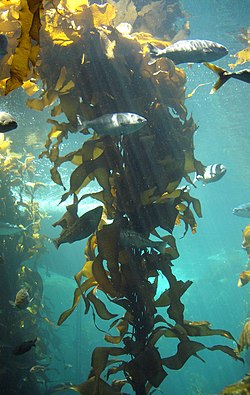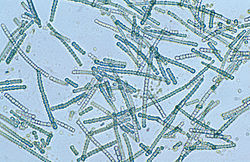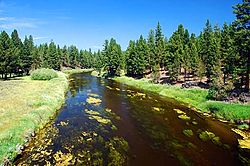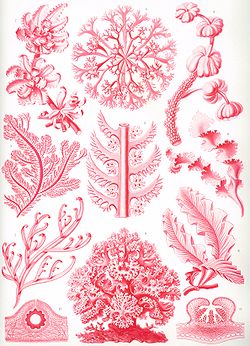Red algae, or Rhodophyta (/roʊˈdɒfɪtə/, /ˌroʊdəˈfaɪtə/; from Ancient Greek ῥόδον (rhódon) 'rose' and φυτόν (phutón) 'plant'), make up one of the oldest...
63 KB (6,312 words) - 21:18, 22 May 2025
are examples of algae with secondary chloroplasts derived from endosymbiotic red algae, which they acquired via phagocytosis. Algae exhibit a wide range...
114 KB (13,078 words) - 21:33, 25 May 2025
Harmful algal bloom (redirect from Harmful algae)
A harmful algal bloom (HAB), or excessive algae growth, sometimes called a red tide in marine environments, is an algal bloom that causes negative impacts...
166 KB (18,619 words) - 02:36, 26 May 2025
Coralline algae are red algae in the order Corallinales. They are characterized by a thallus that is hard because of calcareous deposits contained within...
33 KB (3,666 words) - 19:46, 25 May 2025
Brown algae (sg.: alga) are a large group of multicellular algae comprising the class Phaeophyceae. They include many seaweeds located in colder waters...
59 KB (5,875 words) - 10:05, 25 May 2025
Glaucophyte (redirect from Glaucophyte algæ)
the group varies from about 14 to 26. Together with the red algae (Rhodophyta) and the green algae plus land plants (Viridiplantae or Chloroplastida), they...
11 KB (987 words) - 01:39, 14 May 2025
only known fish species to consume red algae, including ‘black brush’ or ‘beard’ algae. Closely related is the red algae-eater Crossocheilus langei, a species...
7 KB (746 words) - 10:44, 16 July 2024
also occurred in the red and brown algae). Diplobiontic green algae include isomorphic and heteromorphic forms. In isomorphic algae, the morphology is identical...
29 KB (2,666 words) - 05:31, 2 May 2025
Edible seaweed (redirect from Culinary algae)
belong to one of several groups of multicellular algae: the red algae, green algae, and brown algae. Seaweeds are also harvested or cultivated for the...
30 KB (2,628 words) - 06:25, 26 May 2025
Cyanobacteria (redirect from Blue-green algae)
photosynthesis is performed. Photoautotrophic eukaryotes such as red algae, green algae and plants perform photosynthesis in chlorophyllic organelles that...
183 KB (18,314 words) - 19:02, 29 May 2025
one of the only fish that will graze on "black brush algae" (freshwater Rhodophyta, or red algae), but even so will eat anything else in preference. Fishes...
10 KB (947 words) - 08:24, 24 May 2025
Protists in the fossil record (section Red algae)
the diatoms, golden algae, haptophytes (coccoliths), silicoflagellates, tintinnids (ciliates), dinoflagellates, green algae, red algae, heliozoans, radiolarians...
70 KB (7,735 words) - 19:31, 22 May 2025
cultivated within algae scrubbers. Few algae, such as marimo or red moss, are sought after for aquascaping in freshwater aquaria. Green algae respond strongly...
14 KB (1,458 words) - 04:28, 27 May 2025
Dinoflagellate (redirect from Dinoflagellate algæ)
derived from secondary endosymbiosis of red algae, however dinoflagellates with plastids derived from green algae and tertiary endosymbiosis of diatoms...
103 KB (11,050 words) - 23:21, 22 May 2025
green algae, ochrophytes, euglenophytes) to amoeboid cells (chlorarachniophytes) to colonial and multicellular macroscopic forms (e.g., red algae, some...
216 KB (23,064 words) - 10:31, 29 May 2025
edible seaweed used in Japanese cuisine, usually made from species of the red algae genus Pyropia, including P. yezoensis and P. tenera. It has a strong and...
19 KB (2,144 words) - 21:38, 25 May 2025
major group of eukaryotes, comprising the photoautotrophic red algae (Rhodophyta), green algae, land plants, and the minor group glaucophytes. It also includes...
42 KB (4,163 words) - 02:29, 5 May 2025
made of small cubes of agar jelly, a white translucent jelly made from red algae. The agar is dissolved with water (or fruit juice such as apple juice)...
2 KB (198 words) - 23:45, 21 March 2024
Plastid (section In algae and protists)
1.5 billion years ago in the Archaeplastida clade—land plants, red algae, green algae and glaucophytes—probably with a cyanobiont, a symbiotic cyanobacteria...
29 KB (3,287 words) - 21:16, 23 May 2025
Chloroplast (redirect from Red algal derived chloroplast)
membranes of the chloroplast. All secondary chloroplasts come from green and red algae. No secondary chloroplasts from glaucophytes have been observed, probably...
193 KB (19,591 words) - 13:51, 22 May 2025
six eukaryotic lineages: animals, symbiomycotan fungi, brown algae, red algae, green algae, and land plants. Eukaryotes are grouped by genomic similarities...
63 KB (6,253 words) - 07:12, 28 May 2025
definition based on genomes includes the Viridiplantae, along with the red algae and the glaucophytes, in the clade Archaeplastida. There are about 380...
96 KB (8,120 words) - 19:01, 6 April 2025
salinity and temperature. P. cetinaensis differs from other coralline red algae species in that it forms extensive and conspicuous crusts thickened with...
6 KB (641 words) - 18:24, 18 May 2025
tail known as a flagellum, which are known as spermatozoa, while some red algae and fungi produce non-motile sperm cells, known as spermatia. Flowering...
30 KB (3,401 words) - 21:34, 23 April 2025
Agar (category Red algae)
consisting of polysaccharides obtained from the cell walls of some species of red algae, primarily from "ogonori" and "tengusa". As found in nature, agar is a...
36 KB (4,071 words) - 00:11, 24 May 2025
Minium (category Red algae genera)
thalloid algae. The thalli take a crustose form. The only species currently recognised is Minium parvum. Guiry, M.D.; Guiry, G.M. (2008). "Minium". AlgaeBase...
974 bytes (46 words) - 20:51, 26 March 2024
is a herbivore that feeds on brown algae, but its close relative A. californica feeds almost exclusively on red algae. This difference in food sources likely...
8 KB (959 words) - 05:24, 25 May 2025
motility and predation, and lack a cell wall, as found in plants and many algae. This classification remained widespread in the 19th and early 20th century...
52 KB (5,230 words) - 20:10, 24 May 2025
Florideophyceae is a class of exclusively multicellular red algae. They were once thought to be the only algae to bear pit connections, but these have since been...
6 KB (482 words) - 03:32, 26 May 2025
term life history is often used, particularly for organisms such as the red algae which have three multicellular stages (or more), rather than two. Life...
24 KB (2,972 words) - 17:24, 25 May 2025



























